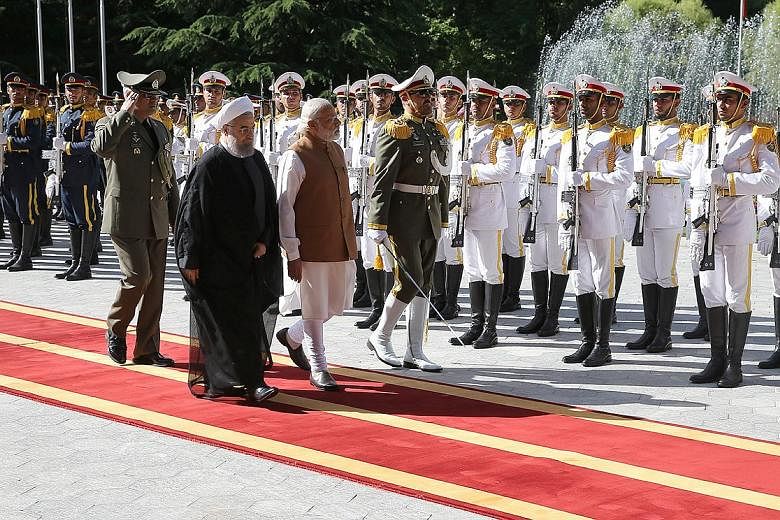NEW DELHI • Prime Minister Narendra Modi always adds a personal touch to India's diplomacy.
There are his well-known bear hugs with world leaders. On his foreign trips, the social media savvy Mr Modi posted a selfie taken with Chinese Premier Li Keqiang that attracted over 31 million hits on his Twitter-like Weibo account.
He also thanked Singapore Prime Minister Lee Hsien Loong on Twitter after they had a vegetarian lunch at Komala Vilas.
In his two years as Prime Minister, Mr Modi has sought to highlight India's soft power, such as by wooing the Indian diaspora, while trying to bolster India's security by shifting a little closer to the United States and Japan with an eye on China.
And through his efforts, Mr Modi has been successful in raising his country's global profile.
"There has been robust diplomacy and he has brought in a lot of dynamism, expending much personal energy in visiting countries with strategic implications for India. The focus has been on a message of support for India's economic growth and security interest," said former Indian foreign secretary Lalit Mansingh.
The weakness, Mr Mansingh noted, "is an absence of strategic thinking on major issues like the core challenges of Pakistan and China".
India and Pakistan have fought three wars, and the 2008 Mumbai terror attacks by Pakistan-based gunmen have been a sore point in their bilateral ties. The Sino-Indian rivalry has also been building up, especially with China's growing assertiveness in recent years.
Though the Gujarat chief minister-turned-prime minister had little foreign policy experience when he took office in 2014, it did not stop him from starting with a bang. One of the first things he did was reach out to India's neighbours by inviting them, including Pakistan's Prime Minister Nawaz Sharif, to his swearing-in ceremony.
Last December, he made a surprise visit to Pakistan which coincided with Mr Sharif's birthday.
Yet ties with Pakistan and China remain strained.
In January, talks between India and Pakistan on moving towards a peace initiative had to be postponed after Pakistan-based terror outfit Jaish-e-Mohammad attacked an Indian Air Force base.
India has also been trying to balance its relationship with China, its biggest trading partner, even as it draws closer to the US.
Last month, Beijing angered New Delhi when it blocked an Indian request to add Masood Azhar, head of the Jaish-e-Mohammad, to a United Nations sanctions blacklist. China has also been blocking India's bid to join the Nuclear Suppliers' Group.
The Indian government came under fire recently when it issued and then withdrew visas for a group of Uighurs who wanted to travel to Dharamsala, the seat of the Tibetan spiritual leader, the Dalai Lama, apparently after Beijing raised objections.
Faced with problems in its own backyard, India looks set to make ties with the US the centrepiece of its foreign policy, with Mr Modi making his fourth visit there next month.
Nirmala Ganapathy


